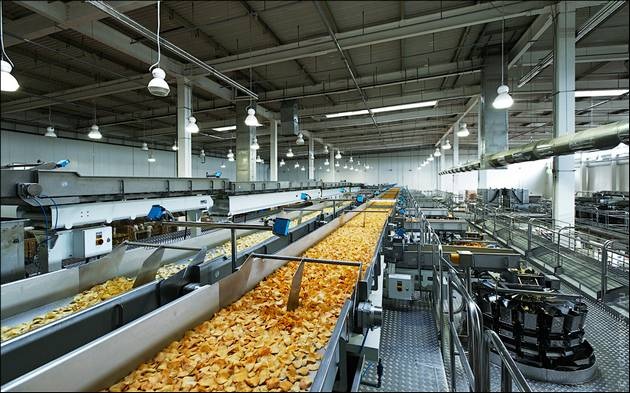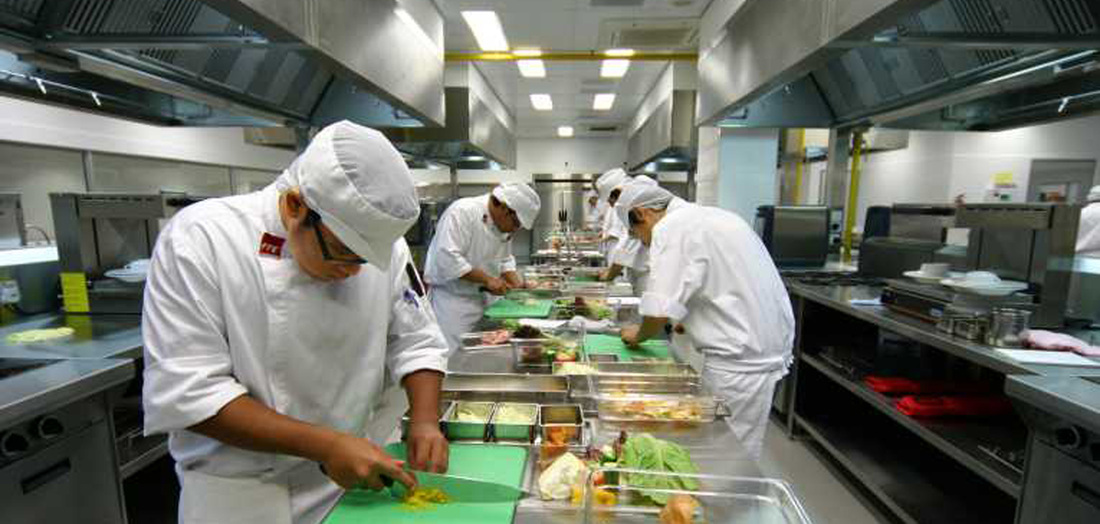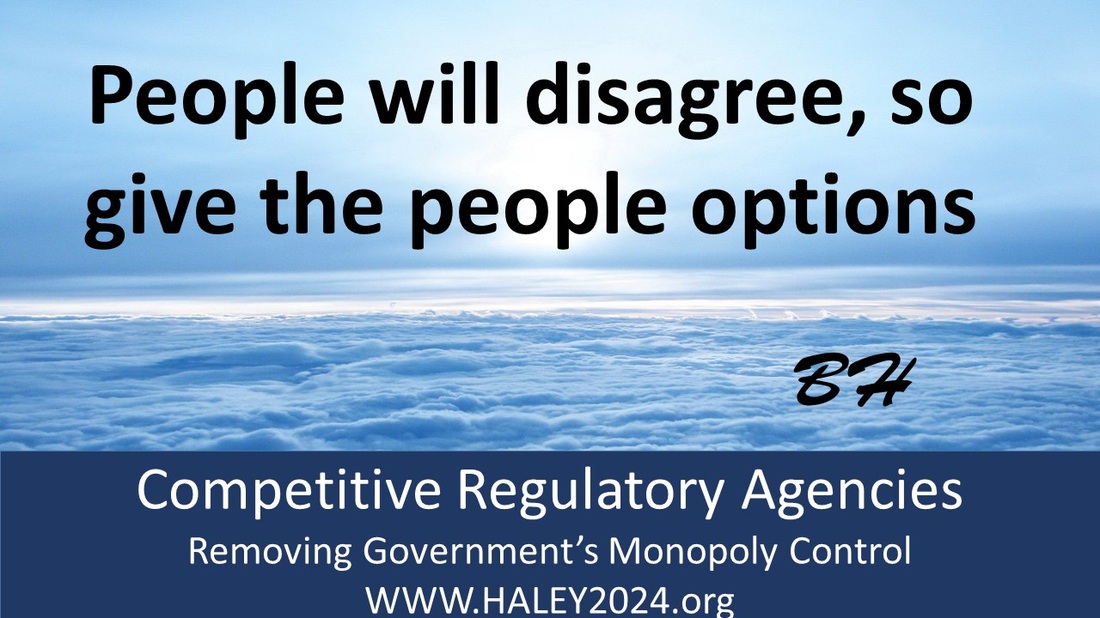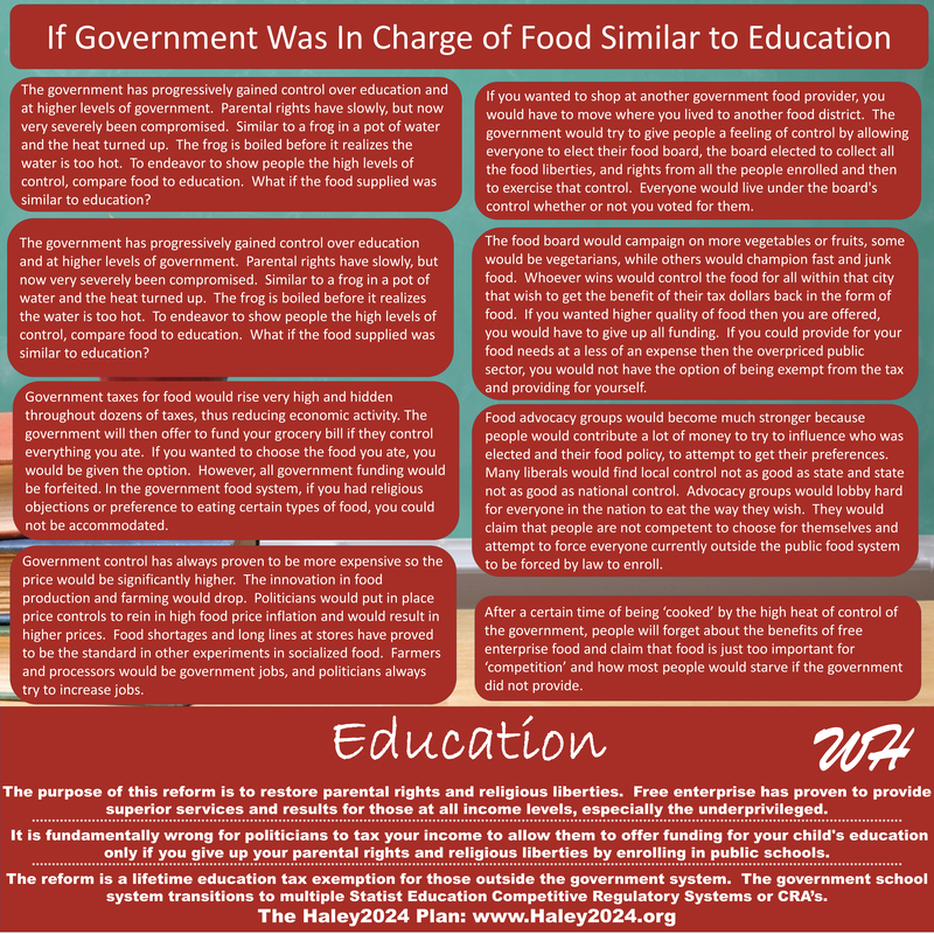| The government has progressively gained control over education and at higher levels of government. Parental rights have slowly, but now very severely been compromised. Similar to a frog in a pot of water and the heat turned up. The frog is boiled before it realizes the water is too hot. To endeavor to show people the high levels of control, compare food to education. What if the food supplied was similar to education? |
| Government taxes for food would rise very high and hidden throughout dozens of taxes, thus reducing economic activity. The government will then offer to fund your grocery bill if they control everything you ate. If you wanted to choose the food you ate, you would be given the option. However, all government funding would be forfeited. In the government food system, if you had religious objections or preference to eating certain types of food, you could not be accommodated. |
| Government control has always proven to be more expensive so the price would be significantly higher. The innovation in food production and farming would drop. Politicians would put in place price controls to rein in high food price inflation and would result in higher prices. Food shortages and long lines at stores have proved to be the standard in other experiments in socialized food. Farmers and processors would be government jobs, and politicians always try to increase jobs. |
| If you wanted to shop at another government food provider, you would have to move where you lived to another food district. The government would try to give people a feeling of control by allowing everyone to elect their food board, the board elected to collect all the food liberties, and rights from all the people enrolled and then to exercise that control. Everyone would live under the board's control whether or not you voted for them. |
| The food board would campaign on more vegetables or fruits, some would be vegetarians, while others would champion fast and junk food. Whoever wins would control the food for all within that city that wish to get the benefit of their tax dollars back in the form of food. If you wanted higher quality of food then you are offered, you would have to give up all funding. If you could provide for your food needs at a less of an expense then the overpriced public sector, you would not have the option of being exempt from the tax and providing for yourself. |
| Food advocacy groups would become much stronger because people would contribute a lot of money to try to influence who was elected and their food policy, to attempt to get their preferences. Many liberals would find local control not as good as state and state not as good as national control. Advocacy groups would lobby hard for everyone in the nation to eat the way they wish. They would claim that people are not competent to choose for themselves and attempt to force everyone currently outside the public food system to be forced by law to enroll. |
| About 3 weeks after posting this article, Don Boudreaux posted this to Café Hayek. In no way am I implying he copied my idea; just that great men think alike (I state humbly). Don is a great economics professor that I learn a lot from on his appearances on ‘ECON Talk’ and on this Café Hayek blog. |
If Groceries Were Supplied Like K-12 Education…by Don Boudreaux on January 23, 2015
in Education
… news reports would regularly include stories of “grocery experts” offering new and “pioneering” proposals to improve grocery distribution, and of the citizens of “grocery districts” meeting with their local “grocery boards” to discuss and debate these different proposals. Each affiliate of a major national network (like each of the national networks), as well as each newspaper and other significant news outlet, would have its own “grocery reporter” (or “grocery correspondent”) to keep tabs on the latest efforts to improve the way government delivers groceries to citizens.
When new big-city mayors are sworn into office they would typically replace the incumbent “Grocery Superintendents” (or “Grocery Chancellors”) with their own preferred “Grocery Superintendents” (or “Chancellors”). The local policy punditry would discuss in great detail the differences in the grocery-supply philosophies of the new Grocery Superintendents compared to those of the outgoing Superintendents. ”Grocery-beat reporters” would often solicit from people on the street these people’s opinions of the different methods proposed to improve grocery distribution. Questions such as “Do you think new Grocery Chancellor Smith’s proposal to allow a handful of people to buy their groceries from charter grocery stores is a good idea? Or do you side with former Chancellor Jones in staunchly opposing charter grocery stores?” would be asked and seriously answered.
Ordinary men and women – physicians, electricians, cab drivers, auto mechanics, professors of economics, web designers, kennel owners, carpenters – almost none of whom have the slightest bit of expertise or experience to qualify them to assess the different methods proposed to deliver groceries, would nevertheless be expected to have such an opinion, and they would be applauded if and when they attend the next meeting of the “Grocery Board” to express their opinions on how best to supply groceries.
When some new method of supplying groceries is chosen, many people will await with great hope and joy the coming improvement in grocery supply – and such people will always suffer disappointment when (as would nearly always be the case) the expected improvement in grocery supply doesn’t materialize. ”Professors of Groceries” in all the top “Schools of Groceries” across the land would debate with each other and with the public the whys and why-nots of the failure of the latest scheme to make America again #1 in international measures of grocery distribution. Newspapers of record would regularly feature headline reports on the “grocery crisis.”
Anyone proposing to get government out of the grocery-supply business would, of course, be ridiculed as being totally unrealistic or being an out-of-touch ideologue, or accused of harboring a secret desire to see the the vast majority of people starve while only the top one percent of the population continues to enjoy excellent access to superb groceries. Likewise, proposals to cut (or to not increase) grocery-district funding would be widely condemned as being pro-starvation proposals. And efforts to measure the performance of grocery-store workers would be mocked as impossible as well as unfair to such workers. Efforts to restrain the pay of grocery-store workers would be portrayed as efforts to deny ordinary citizens access to the best possible supply of groceries.
Ordinary citizens would, in short, be expected to ponder appropriate grocery budgeting as well as alternative grocery theories, and to have informed opinions on all grocery-supply matters – for, in the finest democratic tradition, these citizens, as voters, would be responsible for superintending the supply of groceries.
Be Sociable, Share!
in Education
… news reports would regularly include stories of “grocery experts” offering new and “pioneering” proposals to improve grocery distribution, and of the citizens of “grocery districts” meeting with their local “grocery boards” to discuss and debate these different proposals. Each affiliate of a major national network (like each of the national networks), as well as each newspaper and other significant news outlet, would have its own “grocery reporter” (or “grocery correspondent”) to keep tabs on the latest efforts to improve the way government delivers groceries to citizens.
When new big-city mayors are sworn into office they would typically replace the incumbent “Grocery Superintendents” (or “Grocery Chancellors”) with their own preferred “Grocery Superintendents” (or “Chancellors”). The local policy punditry would discuss in great detail the differences in the grocery-supply philosophies of the new Grocery Superintendents compared to those of the outgoing Superintendents. ”Grocery-beat reporters” would often solicit from people on the street these people’s opinions of the different methods proposed to improve grocery distribution. Questions such as “Do you think new Grocery Chancellor Smith’s proposal to allow a handful of people to buy their groceries from charter grocery stores is a good idea? Or do you side with former Chancellor Jones in staunchly opposing charter grocery stores?” would be asked and seriously answered.
Ordinary men and women – physicians, electricians, cab drivers, auto mechanics, professors of economics, web designers, kennel owners, carpenters – almost none of whom have the slightest bit of expertise or experience to qualify them to assess the different methods proposed to deliver groceries, would nevertheless be expected to have such an opinion, and they would be applauded if and when they attend the next meeting of the “Grocery Board” to express their opinions on how best to supply groceries.
When some new method of supplying groceries is chosen, many people will await with great hope and joy the coming improvement in grocery supply – and such people will always suffer disappointment when (as would nearly always be the case) the expected improvement in grocery supply doesn’t materialize. ”Professors of Groceries” in all the top “Schools of Groceries” across the land would debate with each other and with the public the whys and why-nots of the failure of the latest scheme to make America again #1 in international measures of grocery distribution. Newspapers of record would regularly feature headline reports on the “grocery crisis.”
Anyone proposing to get government out of the grocery-supply business would, of course, be ridiculed as being totally unrealistic or being an out-of-touch ideologue, or accused of harboring a secret desire to see the the vast majority of people starve while only the top one percent of the population continues to enjoy excellent access to superb groceries. Likewise, proposals to cut (or to not increase) grocery-district funding would be widely condemned as being pro-starvation proposals. And efforts to measure the performance of grocery-store workers would be mocked as impossible as well as unfair to such workers. Efforts to restrain the pay of grocery-store workers would be portrayed as efforts to deny ordinary citizens access to the best possible supply of groceries.
Ordinary citizens would, in short, be expected to ponder appropriate grocery budgeting as well as alternative grocery theories, and to have informed opinions on all grocery-supply matters – for, in the finest democratic tradition, these citizens, as voters, would be responsible for superintending the supply of groceries.
Be Sociable, Share!









